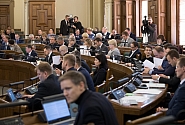
In an extraordinary sitting on Friday, 20 March, the Saeima adopted a special law on measures to prevent and cope with the national threat and its consequences due to the spread of the COVID-19.
The Law aims to lay down measures to prevent and cope with the national threat and its consequences, specific support mechanisms, and expenditures directly related to controlling the spread of COVID-19.
The Law tasks the Cabinet of Ministers with identifying the most affected industries, namely those which have experienced a significant deterioration in their financial situation as a result of the spread of COVID-19 and which are subject to specific support mechanisms. The government will be able to review and supplement the list of the industries. When assessing the economic situation, the Cabinet will be able to set criteria and procedures for companies in other sectors to also qualify for state aid.
The Law enables taxpayers in the most affected industries to apply for a tax extension. They will be free of penalty interest and will not be added to the tax debtor list. The State Revenue Service will be able to reverse the decision to extend the payment deadline if the taxpayer fails to comply with the conditions for granting the aid.
If people working in most affected industries become unemployed or idle, they will be compensated at 75% of their average salary from the previous six months, up to a maximum of EUR 700 per month. The downtime allowance will not be subject to personal income tax nor the state social security contributions, but will cease if the employer hires new employees. The government will be able to determine other support measures in the most affected industries.
The Law frees economic operators from advance payments of personal income tax for the year 2020, starting from 1 January 2020. Payments will be voluntary.
The Law also sets a special procedure for refunding the overpaid VAT from 1 April to 31 December 2020.
During the emergency situation caused by COVID-19, alcohol used for the production of alcohol-based disinfectants will be exempt from excise duty. Operators producing and importing alcohol from another EU member state will be granted a reduction in excise duty coverage by the State Revenue Service.
The Law empowers local governments to review the procedure for paying real estate tax and to change tax payment deadlines in 2020.
The reserve capital for the state-owned development finance institution ALTUM is to be increased, so that crisis-affected companies may use one of the support instruments: loan guarantees or loans for crisis solutions. The amount of funding and the conditions for granting it will be determined by the government.
The Law also provides for other prompt action to address the consequences of the COVID-19 pandemic, such as extending civil liabilities or limits on creditor claims.
During the emergency situation, the Law bans gambling and lotteries, as well as suspends all licenses to organise gambling both on-site, in interactive environment, and via electronic communication services.
The Saeima also ruled that measures to prevent and counter the national threat and its consequences due to the spread of COVID-19 will be financed from the state and municipal budgets allocated to budget-funded institutions, and may also be resourced from contingency funds.
The Law enters into force on the day following its promulgation, while the provisions of the Law are applicable from the moment the state of emergency was declared, that is, 12 March 2020.
Today, the Saeima also adopted relevant amendments to the Commercial Law, allowing meetings of capital company shareholders and general meetings to be held remotely and votes to be cast via online platforms.
Saeima Press Service









